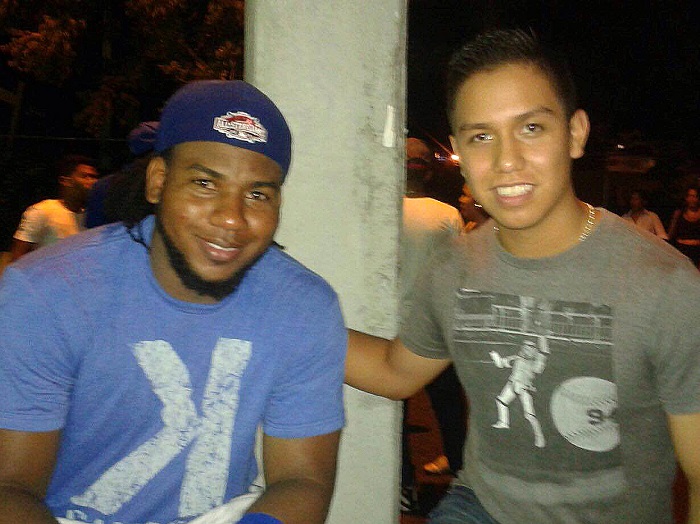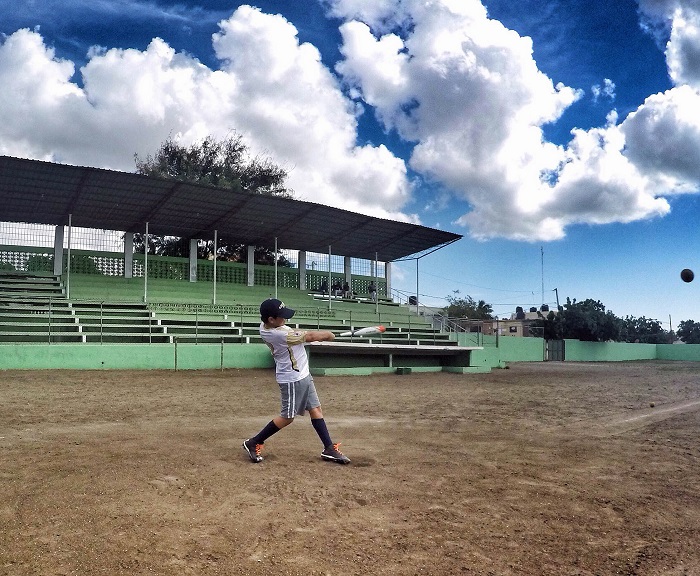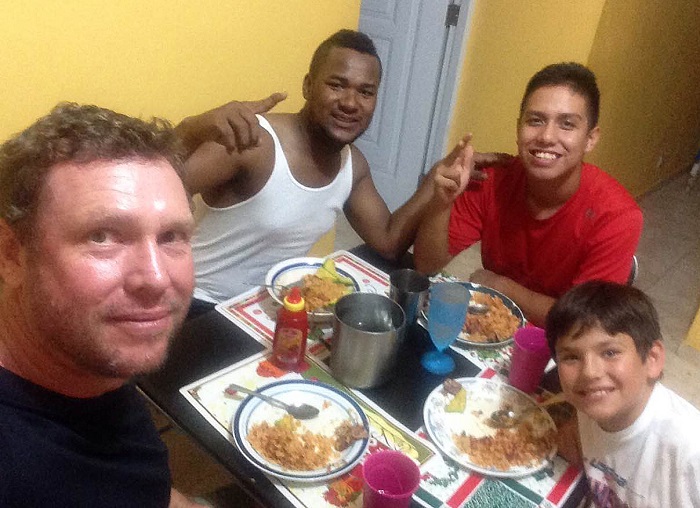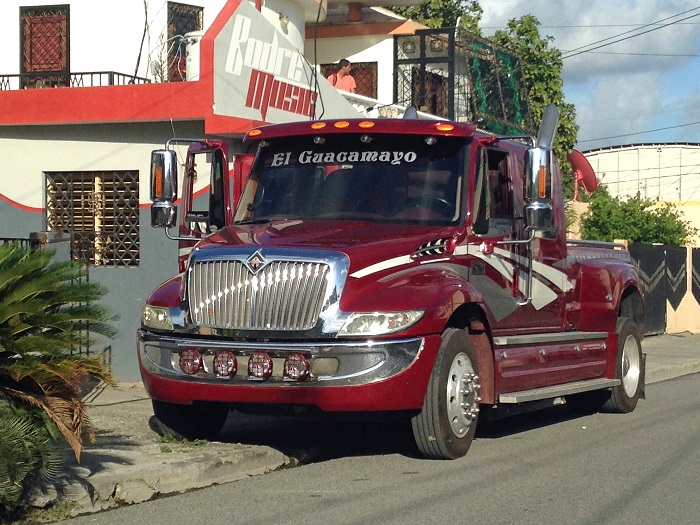Earlier in the year a very dear friend of mine from the baseball world contacted me. I have played alongside the jovial Dominican, Rosendo “Argenis” Percel in different places in Mexico since 2009. Argenis has a huge, bigger-than-life personality and an incredible ability to teach baseball. He is a professional trainer, had a baseball school for children in the Dominican Republic, and has trained many well-heeled prospects from Baní (some currently with the Dodgers, Astros, Royals, and Nationals). He approached me with a proposal. Since I was a lawyer and have been involved at different levels of baseball, he suggested that I mentor and represent a 17-year-old Mexican pitching prospect, Pedro Uriostegui, and that we accompany him to train and play in the Dominican Republic. After a long series of denials, I finally said “yes,” started the Intelligent Baseball Project, and the journey began.

Dodgers pitcher Pedro Baez with 17-year-old Mexican pitching prospect Pedro Uriostegui talking baseball in the Dominican Republic. (Photo credit – Rosendo Percel)
My eldest son, Matias is 11 and trained with Argenis and Pedro for about half a year in Mexico. Pedro became the older brother Matias never had. Argenis always insisted if we went to the Dominican Republic with Pedro that Matias train and play as well. Matias has become an accomplished shortstop and pitcher in his own right playing in both Mexico and the US as well as being selected last summer to participate in the USSSA All-American Games at the ESPN Wide World of Sports in Orlando. He was more than happy to go to the Dominican Republic. Having lived and played in another country for many years, I have always believed it is a great advantage to play in different countries, learn a different baseball culture, and develop tools to play with others in a new environment. This applies equally to an 11-year-old kid as it does to a 17-year-old prospect. Putting our plan into action, we booked our flights.
I had never been to the Dominican Republic and didn’t really know what to expect. I had, of course, read stories of abuse, identity doctoring, and other shifty dealings along with the ubiquitous stream of Dominican stars. What I found was an entire country that is openly crazy about baseball.
“There didn’t seem to be a lot of envy with such a disparity in wealth, perhaps because of the general perception that everyone has a chance to make it big in this incredible baseball gold rush on a small island.”
Matias and I arrived to Santo Domingo and drove the hour or so from the airport to my business partner’s home in Bani. After enjoying a rice dish called “Moros de Habichuelas,” we took the chairs out on the front stoop with a Papaya licuado in hand and talked about baseball. Neighbors would come by, my partner would introduce me, and we would talk more about … you guessed it … baseball – everything from whether Harper is better than Trout to the great Dominican players of the past to Barry Bonds place in history to the never-ending career of the immortal Bartolo Colon – all with Dominican passion of course. As is customary, I was immediately branded with a nickname, “el Mexicano,” which was quickly put into action by all neighbors and passersby who would honk and yell “meeeehhiiiicanooo!”

As 11-year-old Matias Anderson found out, baseball isn’t just a national pastime in the Dominican Republic, it is a way of life. (Photo credit – Robb Anderson)
December is obviously the off-season for those in the majors and the minors. Bani is a city of only about 145,000 people but has more than its fair share of great ballplayers who you can meet at any moment, on any street corner. It is the home of Erick Aybar, Miguel Tejada, Juan Uribe, Vladimir Guerrero, Ivan Nova, Dellin Betances, Michael Pineda, and current Dodger Pedro Baez – just to name a few. Almost everyone you come across seems to have signed a contract at one point or another. It is an easy way of identifying people – “Juan was a shortstop who signed with the Yankees for $100k back in ´10.” That is almost always immediately followed by an assessment of whether they were successful in their career and in saving their money.

Robb Anderson takes a selfie while enjoying dinner with Rosendo Percel, Pedro Uriostegui and Matias Anderson.
(Photo credit – Robb Anderson)
Baní is a strange confluence of baseball passion, poverty, and wealth brought about by signing bonuses or (hopefully) big major league contracts. Those who have signed such contracts show it very openly which is a natural part of life here. On any night of the week you can go to a famous outdoor watering hole called (of course) the “Play Ball” to have a cold Presidente beer and see a stream of the ridiculously expensive cars of current major leaguers (Ferraris and customized semis) line up right next to the more modest vehicle of choice for the normal person in Baní, the moped. Everyone was very cordial and said “hello” but no one was bugging these millionaire MLB stars as they hung out with everybody else. But there didn’t seem to be a lot of envy with such a disparity in wealth, perhaps because of the general perception that everyone has a chance to make it big in this incredible baseball gold rush on a small island.

Former Dodger Juan Uribe is easy to spot in his hometown of Bani by the truck he drives.
(Photo credit – Robb Anderson)
Okay. So that was “day one” of my baseball adventure. The actual baseball hasn’t really started yet at this point in the story but I am already learning the business of baseball in the Dominican Republic as fast as I am absorbing the salty ocean air of Baní.




 January 8th, 2016 at 6:00 am
January 8th, 2016 at 6:00 am  by Robb Anderson
by Robb Anderson  Posted in
Posted in 

What an awesome story, Robb! I have long known how big baseball is in the DR but didn’t realize it was THIS big.
Love how approachable the players are regardless of their MLB status.
Thanks for sharing this.
Thanks, Ron. I have really been able to see a different angle that most people from outside Bani and the DR rarely see thanks to my business partner, Argenis. It was a little surreal but if our program comes to fruition, we will be there on a regular basis. I am going to lay it out right here in upcoming articles — a Think Blue LA exclusive!
That will be awesome, Robb. Can’t wait for the next installment!
Sounds absolutely wonderful Robb. Thanks for the update.
Hi to Matias from Nova Scotia. Swing looks great. Head down, nice follow through.
Thanks Harold! Matias has had his swing groomed in true Dominican style and format for about half a year. The other little kids that he played with were very impressed and quite confused at the same time.
What a super opportunity Robb. Wish I was there to experience it.
Love what Uribe has done to Ted Lilly’s truck.
Evan, the cars of the MLB players were quite flashy. The streets aren’t that wide in Bani and mopeds and motorcycles are constantly buzzing around you like a swarm of bees so to have a “tricked out” semi that was imported from the US is quite the statement. Vladimir Guerrero has one as well with speakers that opened in the back.
Ted Lilly had one of those? Maybe that is where he got the idea.